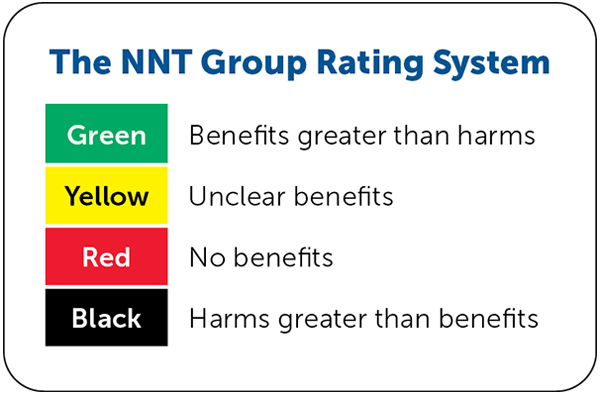
Am Fam Physician. 2015;92(7):573
Author disclosure: No relevant financial affiliations.

| Number needed to treat = 8 to prevent infection | |
|---|---|
| Benefits | Harms |
| 1 in 8 upper respiratory tract infections prevented over at least 3 months | None were harmed |
Details for This Review
Study Population: Healthy children and adults from six countries at average risk of upper respiratory tract infection (URTI)
Efficacy End Points: Incidence of URTI, duration of illness, work or school days lost
Harm End Points: Medication adverse effects
Narrative: Most treatments of URTI aim to control symptoms, because URTIs tend to self-remit in a few days to a week. It has been suggested that certain probiotic agents have the potential to prevent and mitigate URTI through immune-modulating properties. This Cochrane review examined 12 randomized trials (n = 3,720) of probiotics vs. placebo to prevent URTI.1 Included trials variably enrolled healthy children, adults, and older adults, while excluding trials examining persons at low risk (competitive athletes) and high risk (children prone to otitis).
The studies demonstrated a reduction in episodes (number needed to treat to prevent one URTI = 8 during at least three months of treatment) and duration of URTI (mean difference = −1.89 days; 95% confidence interval [CI], −2.03 to −1.75). However, the rate ratio of URTI in patients exposed to probiotics compared with placebo was not significant (0.83; 95% CI, 0.66 to 1.05), suggesting that the number of URTIs was not affected overall. One low-quality trial suggested probiotics may reduce cold-related absences from work or school. Adverse effects were minor, with no statistically significant difference between groups.
Caveats: The quality of evidence for included trials was low or very low. Probiotics appear to have multiple positive effects for prevention of URTI and URTI-associated outcomes, although better quality studies are needed to determine a definitive benefit. The heterogeneity of the studies did not allow for definitive determination of which probiotics may be beneficial because the studies used a variety of probiotic species and delivery methods (e.g., dairy-based, capsules, powders).
Conclusion: Based on current evidence, probiotics may be better than placebo for reducing the number of patients who experience an acute URTI and for reducing URTI duration. However, based on the limited numbers and equivocal results, high-quality, large-scale studies are needed to address whether probiotics truly affect URTI outcomes.
